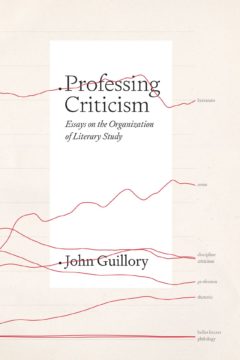 Jeffrey Herlihy-Mera in the LA Review of Books:
Jeffrey Herlihy-Mera in the LA Review of Books:
SINCE NYU PROFESSOR John Guillory’s book Professing Criticism: Essays on the Organization of Literary Studies appeared last fall, perusing the ensuing debates has been like eavesdropping on a tiff among academic stars. Critique of the book has added important context on political and cultural topics, as well as on the author’s tenuous attempt to link the notion of “profession” to “criticism.” Essays have appeared in The New Yorker, The New York Times, the London Review of Books, and The Chronicle of Higher Education, by faculty at Cambridge, Wesleyan by way of Oxford, two from the same professor at Columbia, and a follow-up from Guillory himself. This is evidence of a remarkable level of commercial demand for literary critique across popular media. But that traction is deceptive. The circumstances of those authors, the experiences they draw upon for context and reference, are unlike those of nearly everyone else in the academy. This popular focus on perspectives honed at prestigious universities frames the discussion of the purported “crisis” of literary studies in misleading ways.
The New Yorker recently ran a piece, focused largely on Harvard’s English program, that used a binary top/“bottom” comparison to English at Arizona State University. (The piece was written by Nathan Heller, a Harvard grad.) Comparisons like this complicate things. In many ways ASU is superior to Harvard: the former’s Humanities Lab is among the most innovative in the country, and the school has resources superior to those at many flagship campuses. James Marino at Cleveland State University has observed how damaging the pervasiveness of views like these can be for public institutions.
More here.
